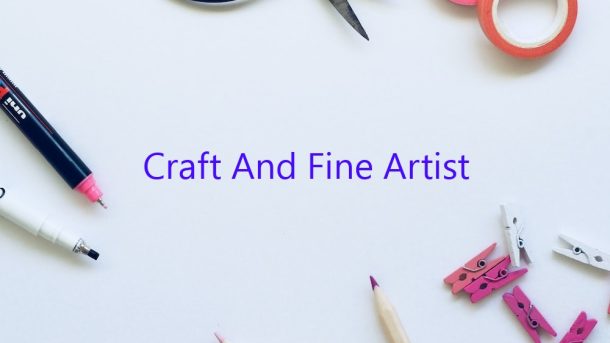Craft and fine artists are creative professionals who use various materials to produce art. They may work in a studio, or they may create art on location.
Craft artists create functional or decorative objects from a variety of materials, including wood, metal, glass, and textiles. They may work alone or in teams, and may specialize in a particular type of craft.
Fine artists create original works of art, often using traditional or non-traditional media. They may work in a variety of styles, and may be self-taught or formally trained.
Both craft and fine artists may be commissioned to create art for private or public spaces. They may also sell their work through galleries, art auctions, or other venues.
The skills required to be a craft or fine artist are varied and can include:
-Drawing and sketching
-Designing
-Craftsmanship
-Creativity
-Problem solving
Craft and fine artists often have a passion for art and a dedication to their craft. They may also have strong interpersonal skills, as they often work collaboratively.
Contents [hide]
What do craft and fine artists do?
What do craft and fine artists do?
Craft artists make utilitarian objects such as pots, bowls, and furniture. Fine artists, on the other hand, create original pieces of art that may be displayed in museums or sold in galleries.
Craft artists may use a variety of materials, including wood, metal, glass, and clay. They may also use a variety of techniques, such as carving, welding, and pottery.
Fine artists may use a variety of mediums, including paint, pencil, and charcoal. They may also use a variety of techniques, such as drawing, sculpting, and printmaking.
Many craft and fine artists teach art classes or workshops. They may also work as art therapists or art directors.
What is the difference between a fine artist and a craft artist?
There is a big distinction between fine artists and craft artists. While craft artists may use some of the same techniques as fine artists, their end goal is usually to create a more utilitarian object.
Fine artists, on the other hand, are more concerned with creating something that is beautiful or has a higher level of aesthetic value. Their work is usually more about expression and self-expression, rather than simply creating a useful object.
This doesn’t mean that craft artists can’t create beautiful objects, or that fine artists can’t create useful objects. It’s simply a distinction between the two types of artists.
Fine artists often receive more formal training in art history and aesthetics, while craft artists may have more training in specific techniques. However, there are many talented artists who fall somewhere in between, and don’t neatly fit into either category.
What is considered a fine artist?
What is considered a fine artist?
There is no definitive answer to this question, as the definition of a fine artist can vary depending on who you ask. However, in general, a fine artist is considered to be an artist who creates original works of art that are considered to be of high quality.
Some of the most commonly recognized forms of fine art include painting, sculpture, and printmaking. However, there are many other forms of fine art, such as photography, installation art, and performance art.
The term “fine art” is often used to distinguish the work of professional artists from the work of amateurs or hobbyists. In order to be considered a fine artist, you typically need to have completed formal training in the arts and have a body of work that is considered to be of high quality.
Is craft considered fine art?
There is no definitive answer to this question, as the distinction between craft and fine art is not always clear. However, in general, craft is often seen as more utilitarian, while fine art is considered to be more creative and expressive.
One characteristic that is often used to distinguish craft from fine art is the use of materials. Craft objects are typically made from more everyday materials, such as wood, metal, or fabric, while fine art pieces may use more expensive or exotic materials, such as gold, silver, or ivory.
Another distinction between craft and fine art is the level of skill required to produce the work. Craft objects are often made using a series of predetermined steps or techniques, while fine art is often more improvisational, with the artist often improvising as they work.
However, there are many blurred lines between craft and fine art, and it is often difficult to make a clear distinction. Many artists work in a range of mediums, and may use both craft and fine art techniques in their work. Additionally, the distinction between craft and fine art is often subjective, and different people may have different opinions on what constitutes craft and what constitutes fine art.
In the end, it is up to each individual to decide what they consider to be craft and what they consider to be fine art. However, by understanding the distinctions between the two, you can better appreciate the unique qualities of each form of art.
Is fine art a good career?
Is fine art a good career?
There is no simple answer to this question as it depends on a variety of factors, including your level of talent, the market for your work, and your personal preferences. However, if you are passionate about art and are willing to put in the hard work, then a career in fine art can be very rewarding.
One of the benefits of a career in fine art is that you can be very creative in your approach. There are no rules or limitations, which means you can experiment with different mediums and styles as much as you want. This can be a lot of fun, but it also requires a lot of dedication, as you need to constantly improve your skills in order to stay ahead of the competition.
Another advantage of a career in fine art is that there is a lot of potential for growth. As your skills improve, you may be able to find more prestigious and lucrative opportunities, such as gallery representation or commissions from private collectors. You may also be able to teach art classes or workshops, which can be a great way to share your passion with others and make a little extra money.
However, there are also some disadvantages to consider before making a career in fine art. For one, the market for art is often unpredictable, so it can be difficult to make a living from your work. You may also need to be willing to travel and exhibit your work in different parts of the world in order to make a name for yourself.
Overall, a career in fine art can be a lot of fun and very rewarding, but it takes a lot of hard work and dedication. If you are passionate about art and are willing to put in the effort, then a career in fine art may be the right choice for you.
What is the income of a craft artist?
There is no one definitive answer to the question of what the income of a craft artist is. It can vary greatly depending on the type of craft, the artist’s level of experience, and the size and scope of their business. However, according to a report by the U.S. Bureau of Labor Statistics, the median income for craft artists in 2016 was $31,260.
There are a number of ways for craft artists to generate income. They can sell their work through galleries, at art fairs, or online; they can teach classes; or they can collaborate with other businesses, such as interior designers, to create and sell custom pieces.
Many craft artists start out by selling their work out of their homes, which can be a great way to get started but may not be the most lucrative option in the long run. Galleries can provide a more reliable stream of income, but they can be difficult to break into, and art fairs can be very competitive. Online sales can be a great option for reaching a wider audience, but it can be difficult to get people to buy art online without being able to see or touch it first.
Teaching classes can be a great way to make money while also sharing your skills and knowledge with others. It can also be a great way to build a network of contacts and get your work seen by more people. Collaborating with other businesses can be a great way to get your work seen by more people and to make more money, but it can also be more complicated and require more work.
Overall, the income of a craft artist can vary greatly depending on a number of factors. However, the median income for craft artists in 2016 was $31,260, so that is a good starting point to aim for.
What are the three types of craft?
There are three main types of craft: Folk art, Fine art, and Decorative art.
Folk art is created by people who don’t have formal training in the arts. They often use everyday materials to create art that has a functional purpose, such as clothing, quilts, and furniture.
Fine art is created by artists who have studied the arts and have developed their skills through practice and training. Fine art is typically created for exhibition or sale, and it can be in any medium, such as painting, sculpture, or photography.
Decorative art is created to enhance the appearance of a space. It can be functional or purely aesthetic, and it can be made from a variety of materials, such as metal, glass, or wood.




